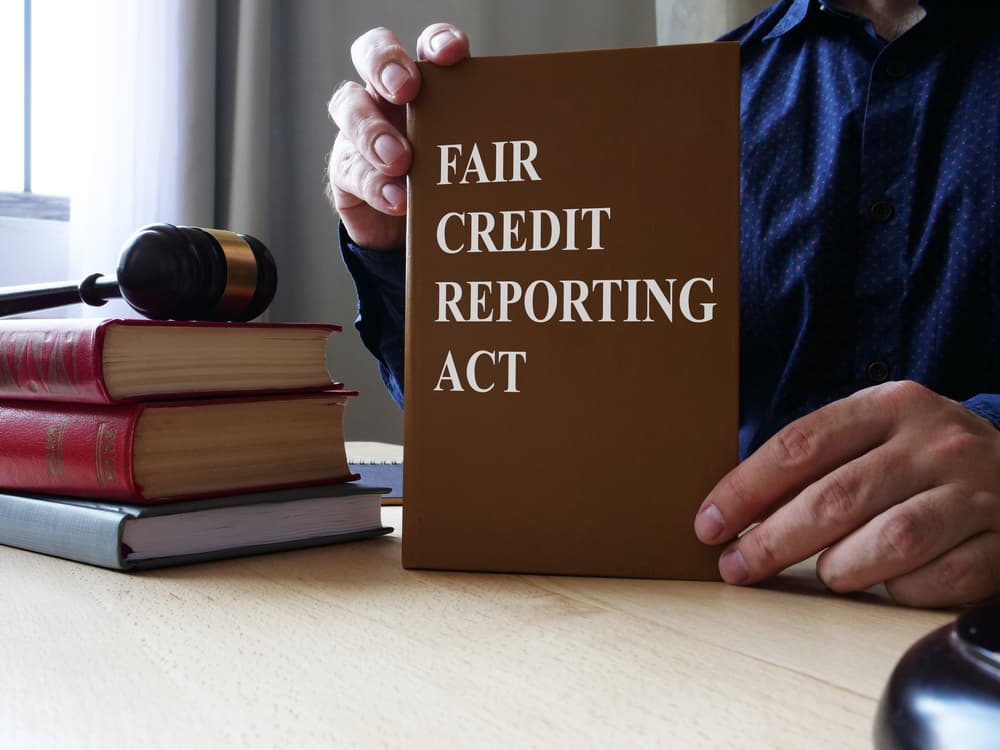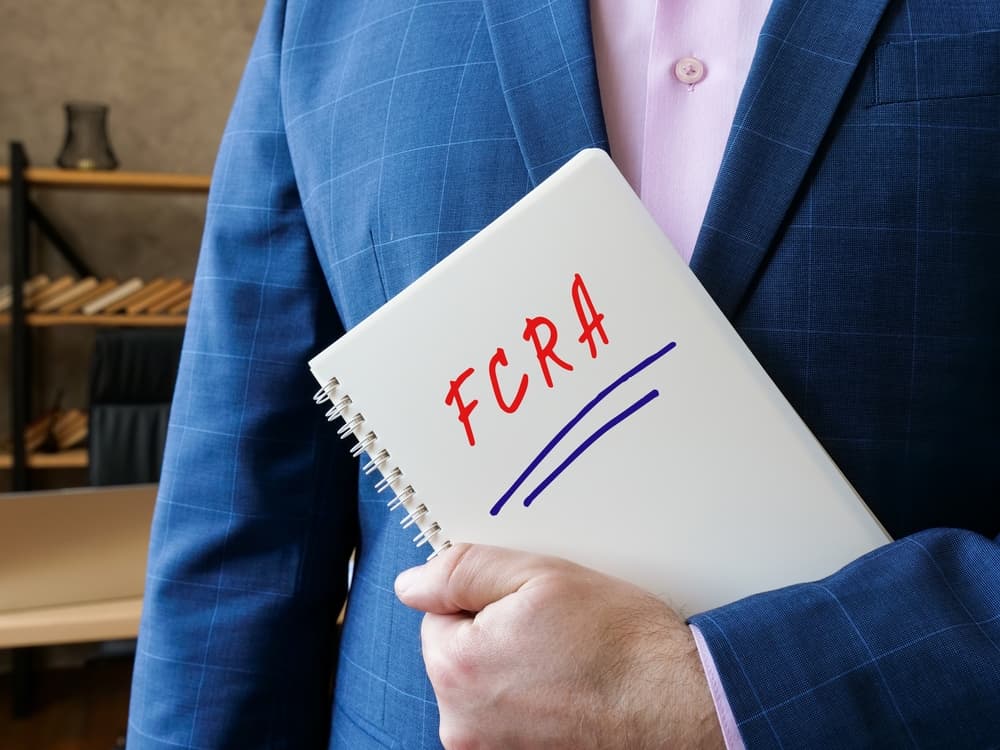Californians have a powerful credit reporting ally. Enacted to safeguard consumer’s credit reports, the Fair Credit Reporting Act (FCRA) establishes a legal framework to ensure fair and accurate credit reporting practices.
California decided to offer additional protections to its denizens which goes beyond federal guidelines.
This guide, by the Kazerouni Law Group, delves into the aspects of federal and state credit reporting laws tailored specifically to your credit reporting rights as a California consumer.
For further legal advice on your rights as a California consumer, consult a California credit reporting attorney for a comprehensive understanding of how these laws work to shield your credit information.
Understanding the FCRA in California

For Californians struggling with errors and inaccurate information on their credit reports, understanding how the FCRA can help you is not just a necessity—it's a fundamental right.
The Fair Credit Reporting Act (FCRA), established in 1970, forms the cornerstone of consumer credit rights in the United States.
This federal law is designed to ensure the accuracy, fairness, and privacy of consumer information in the files of credit reporting agencies.
Central to the FCRA's mandate is its provision for consumers to access and correct their credit information, thus playing a pivotal role in financial and credit decisions.
The Act governs how credit bureaus collect and disseminate personal credit information, ensuring consumers are treated equitably and that their information is handled responsibly.
Furthermore, the FCRA sets the stage for how disputes about inaccuracies are resolved, providing a clear pathway for consumers to challenge and rectify errors on their credit reports.
California’s Enhancement to FCRA Protections
While the federal FCRA sets the baseline for consumer credit rights, California has taken further steps to enhance these protections.
California’s consumer protection initiatives demonstrate a strong commitment to consumer privacy and accuracy in credit reporting, building upon the FCRA's foundation.
These enhancements address specific areas where Californians have access to additional safeguards beyond what federal regulations provide.
For instance, California's laws focus on stricter regulations for credit reporting agencies, offering more robust privacy protections and greater control for consumers over their financial data.
This proactive approach ensures Californians enjoy some of the most comprehensive credit rights in the nation, reflecting the state's dedication to protecting its residents in the financial sphere.
Key Rights Under FCRA for California Consumers
California consumers enjoy specific rights under the FCRA that are crucial in managing their credit information:
- Access to Credit Reports. Californians have the right to a free credit report every 12 months from each of the three major credit bureaus.
- Accuracy of Information. Credit bureaus must ensure information on credit reports is accurate. Californians have the right to dispute any errors or inaccuracies, which must be investigated and corrected by the bureaus.
- Dispute Resolution. If inaccuracies are found, consumers can file disputes. Credit bureaus are required to investigate these disputes within 30 days.
- Privacy and Consent. Personal credit information cannot be accessed without the consumer's consent, except under specific legal circumstances.
- Notification of Negative Information. Consumers must be notified if negative information is added to their credit report.
These rights empower Californians to maintain accurate credit reports and protect their financial identities.
Exclusive Consumer Credit Rights for Californians
In addition to federal FCRA protections, California grants additional rights to its residents:
- Security Freeze. California consumers can place a security freeze on their credit reports. This action restricts access to their credit report, helping to protect against identity theft.
- Protection for Minors. The state allows parents or guardians to create and freeze a credit report for minors. This proactive measure is crucial in preventing identity theft targeting children.
These California-specific rights enhance consumer protection and provide additional control over personal financial data.
When you know your credit reporting rights, you can further safeguard your credit information and maintain your financial security.
What Is the California Consumer Credit Reporting Agencies Act?
The California Consumer Credit Reporting Agencies Act (CCRAA) enhances consumer protection in credit reporting, similar to the federal Fair Credit Reporting Act (FCRA).
This state-specific legislation governs how credit agencies manage consumer credit information in California.
It sets stringent guidelines on what can be included in credit reports and regulates how long negative information can stay on these reports, thus impacting Californians' financial borrowing capabilities.
Additionally, under the CCRAA, California has specific requirements for credit reporting agencies regarding arrests and convictions. For example, information about an arrest or indictment must be removed from credit reports after seven years.
If the arrest or indictment did not lead to a conviction, or there was a pardon, this information must be immediately removed from the report.
Californians can dispute inaccuracies on their credit reports, and if unresolved, they may have the right to sue for damages under federal law.
Addressing California Credit Reporting Issues
When California consumers face credit reporting issues, such as inaccuracies or identity theft, they have several avenues for resolution:
- Direct Contact with Credit Bureaus. The first step is to contact the credit bureau that is reporting the inaccurate information. The FCRA mandates that bureaus investigate and respond to your dispute.
- Legal Recourse for Non-Compliance. If a credit bureau fails to correct inaccuracies, consumers may have the right to seek legal action, potentially entitling them to damages.
- Identity Theft Protection. In cases of suspected identity theft, consumers can place a fraud alert on their credit reports and may consider a security freeze for added protection.
Prompt and informed action is essential in dealing with credit reporting issues to protect one's credit score and legal rights.
Additionally, for guidance on resolving credit report issues, the Federal Trade Commission's Identity Theft website provides valuable resources.
Understanding Your Right to Sue for FCRA Violations in California
Taking Legal Action for FCRA or CCRAA Violations
In California, if your rights under the Fair Credit Reporting Act (FCRA) or the California Consumer Credit Reporting Agencies Act (CCRAA) are violated, you have the legal right to take action against the offending parties. This can include credit bureaus, creditors, or any entity that has misused your credit information.
Examples of Scenarios Necessitating Legal Action
- Persistent Inaccuracies in Credit Reports. If your credit report contains errors and the credit reporting agency fails to correct these inaccuracies despite your disputes, you may need to consider legal action. This is particularly relevant if these errors negatively impact your ability to obtain credit, employment, or housing.
- Misuse of Credit Information. If a creditor or any other entity uses your credit information without proper authorization or in violation of the FCRA or CCRAA guidelines, this can be grounds for a lawsuit. Examples include unauthorized credit checks or the use of outdated negative information.
- Failure to Investigate Disputes. Credit bureaus are required to investigate any disputes regarding inaccuracies in credit reports. If they fail to conduct a reasonable investigation or do not respond within the stipulated timeframe, this could justify legal proceedings.
- Incorrect Reporting of Debt. If a creditor reports debt that you do not owe or inaccurately reports the status of your debt, this could be a violation of your rights under these laws.
5 Types of Damages and Relief You Can Expect for Credit Reporting Violations
- Statutory Damages. In certain cases, you may be entitled to statutory damages, which are set amounts prescribed by law. These damages can be awarded regardless of whether you have suffered actual financial losses.
- Actual Damages. If the violation has led to actual financial losses, emotional distress, or harm to your reputation, you may be able to recover these damages. This could include compensation for denied loans, higher interest rates due to incorrect credit reporting, or emotional distress.
- Punitive Damages. In cases where the violation is found to be willful or malicious, the court may award punitive damages. These are meant to punish the violator and deter future misconduct.
- Attorney’s Fees and Costs. If you win the lawsuit, you may also be entitled to have your attorney's fees and court costs covered by the offending party.
- Injunctive Relief: Apart from monetary compensation, the court may also order the credit reporting agency or creditor to correct the inaccuracies or cease their unlawful practices.
Consult a California Credit Rights Attorney
FCRA and CCRAA are complex laws.
If you believe anyone violated your rights, consult an attorney experienced in credit reporting law.
An attorney can assess your case, guide you through your legal options, and help you pursue the appropriate action to protect your rights and achieve justice.
How to Choose the Right Credit Reporting Rights Attorney in California
Evaluating Attorney Experience and Knowledge

- Focusing on Credit Reporting Laws: Look for an attorney who concentrates on credit reporting laws, including the Fair Credit Reporting Act (FCRA) and the California Consumer Credit Reporting Agencies Act (CCRAA). An attorney who can use both federal and state credit reporting laws ensures that the attorney is well-versed in the nuances of these laws and how they apply to your case.
- Review Past Case Successes: Investigate the attorney's track record. Ask about cases they have handled that are similar to yours, especially those involving credit reporting issues. Successful outcomes in past cases can be a good indicator of the attorney's capability and experience.
- Assess Legal Strategy and Approach: Every legal case is unique. Ensure that the attorney you choose is willing to tailor their approach to suit the specifics of your situation. A one-size-fits-all strategy might not be effective in addressing the particularities of your case.
Questions to Ask Potential Credit Reporting Attorneys
- What is your experience with cases like mine? This question helps you understand the attorney's familiarity with cases involving credit reporting rights.
- How do you approach a case involving FCRA or CCRAA violations? The answer will give you insight into the attorney's strategy and whether it aligns with your expectations.
- Can you provide examples of successful outcomes in similar cases? Past successes, while not guaranteeing future results, can indicate the attorney's competence in handling credit reporting disputes.
- What are your fees and billing practices? Understanding how the attorney charges, whether it's a flat fee, hourly rate, or contingency basis, is essential for financial planning.
- Who will handle my case? In some law firms, your case may be passed to less experienced attorneys or paralegals. Clarify who will be directly working on your case.
Considering Free Initial Consultations
- Many attorneys offer a free initial consultation. This meeting allows you to discuss your case without any financial commitment and assess whether the attorney is a good fit for you.
- Use this opportunity to ask the questions mentioned above and to gauge your comfort level with the attorney’s communication style and approach.
- During the consultation, observe if the attorney listens to your concerns attentively and provides clear, understandable explanations. You want an attorney who is not only knowledgeable but also empathetic to your situation.
Choosing the right attorney for your credit reporting rights in California cannot be overstated. It is a critical step in protecting your credit reporting rights and getting compensation for harms and losses caused by violations of credit reporting laws.
A California consumer protection lawyer with the right experience and approach can significantly influence the outcome of your case.
Take your time to research and choose an attorney who you feel confident will represent your best interests effectively.
Seeking Legal Assistance With Kazerouni Law Group

If you're encountering challenges with credit reporting or suspect your rights under the FCRA have been violated, seeking legal guidance is a prudent step.
The Kazerouni Law Group specializes in consumer credit law and can assist in navigating the complexities of FCRA regulations:
- Experience in Consumer Credit Law. With over $1 billion in awards and settlements, the attorneys at Kazerouni Law Group have the skills, resources, and tenacity to promote a successful outcome in the cases they take on.
- Personalized Legal Strategy. Our consumer credit protection lawyers in California can provide tailored legal solutions, focusing on each client's unique situation to effectively address credit reporting issues.
- Advocacy and Representation. From disputing inaccuracies to handling identity theft cases, their legal team offers skilled advocacy and representation.
For specific legal advice or to address credit reporting concerns, contact a fair credit reporting lawyer in California at the Kazerouni Law Group at 800-400-6808 or talk with an attorney online to find out how you can get credit reporting help today.